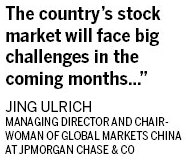Stocks temporarily touch 3-year low, weighed down by declining profits
The Chinese mainland stock index temporarily fell to its lowest point in three years on Monday, blowing away investor confidence in public companies' profitability amid the sluggish external and domestic economy.
|
|
 |
|
|
The Shanghai Composite Index, which tracks the biggest listed companies' stocks in the A-share market, closed 0.4 percent lower on Monday at 2106.96, the lowest since July 31. During the trading day, it temporarily dipped to 2089.02, a three-year low.
The main gauge of stock has lost 14 percent from the year's peak on March 2 and 2.5 percent in the past week, with investors speculating that growth in the world's second-largest economy may not rebound in the third quarter, considering the difficult corporate situation of many industrial companies.
Jing Ulrich, managing director and chairwoman of global markets China at JPMorgan Chase & Co, said on Monday that overseas investors, including some big hedge funds that focus on short-term investments, turned more cautious about the Chinese stock market, worrying about the decreasing profits of public companies, especially in the manufacturing sector.
"The country's stock market will face big challenges in the coming months as the competition between similar businesses is expected to become more fierce and the problem of excess production capacity will be more obvious," she said at a media conference in Beijing.
The stubborn European credit crisis and weak overseas demand look likely to linger, which can further pile pressure on domestic manufacturers, pushing them to cut selling prices, according to Ulrich.
According to the National Bureau of Statistics, the industrial output of big companies increased in July by 9.2 percent year-on-year, compared with 9.5 percent in June, the slowest growth rate this year.
"The unpleasant situation for industrial companies is unlikely to change until the second quarter next year, which means that the gloomy stock index may continue without any sudden rebound," she said.
Public companies in the banking and real estate sectors dropped the most on Monday, on concern that the government might hold on to measures to curb property sales and slower monetary policy loosening.
Commercial bank profits have been influenced by the People's Bank of China's previous asymmetric cut in benchmark interest rates, because it has narrowed the interest margin between deposit and loan. This means bank shares may face pressure in the coming months, said Liu Ying, an analyst with the Huatai Securities Co Ltd.
"If the banking sector cannot perform well, it may drag down the whole index," Liu said.
On Monday, the data showed that property stocks in the Shanghai Composite dropped 1.3 percent, the most of the five industry groups.
"As the NBS figures have indicated that property prices are under pressure to continue rising, the government may keep its tight policies and prevent the (property) bubble from bursting," said Ulrich.
